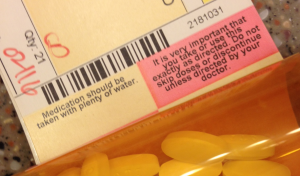Do you have basic survival gear packed and ready? The dozen or so basics plus personal items? Water for at least three days?
What about supplies for the longer term?
Enough for 10-14 days
We work on a 10-14 day plan, since that’s how long it could take in a widespread emergency for rescue workers and government agencies or the Red Cross to reach us. And when we look at that time frame, we see an immediate problem. It’s medicines.
Many prescriptions can’t be renewed in advance.
Most medical and pharmaceutical offices have a policy of not renewing prescriptions until the last possible minute – that is, not until the current supply is exhausted, or, at the most, 2-3 days before the last pill or dose is due.
On its surface this seems like a rational policy, and, of course, is probably the best way to manage inventory.
But, on closer examination, the logic breaks down completely. If the disaster hits when you’re down to your last 3 or 4 pills, you could be facing a compound emergency.
“Do not skip doses or discontinue.”
You may survive the disaster only to have created a medical emergency for yourself! How often have you seen a message like the one in the image: “Do not skip doses or discontinue unless directed by your doctor.”
Power outages will make purchasing medicines impossible.
Following a major disaster, entire regions may be without electricity. This means ATMs, credit cards, and gas stations won’t be working. Mail won’t be delivered.
This also means medical offices and pharmacies, along with all other businesses in the region, may be closed entirely. It could be days or weeks before life returns to normal – and thus days or weeks before you can get your prescription refilled in the normal way.
Discuss this with your physician and pharmacist.
Could your first prescription be renewable after two weeks instead of only after 30 days? Or could the initial prescription contain enough for 45 days, and not just the usual 30? You’d then at least have a chance of having enough pills so you could continue your prescribed treatment even if your normal source of medicines is unavailable.
We suggest that you have this discussion with your physician and/or your pharmacist. Surely they will see the logic of your request — unless they simply don’t see the benefit of preparing for emergencies. You might want to put your request in writing to get “on the record” and give them something to work with.
Consider this fall-back strategy.
In the face of this problem, we order refills as soon as we can: in 25 or 26-day increments. This gives us the chance to build up an extra 14-day supply, 3 or 4 pills at a time.
We keep the extras in our survival kit, rotating them regularly to be sure they are fresh. Naturally, this means the kit has to be opened up and closed up again pretty often.
It seems a shame to have to “outwit the system” this way, but when health (or even survival) is at stake, it’s simply necessary.
Don’t overlook this survival kit item.
If you know friends or family dependent on medications, send this post to them and suggest they print off a copy for their doctor and their pharmacist. And encourage them to consider how they will get that extra 10-14 days’ supply of prescription medicines to keep them going in an emergency.
Emergency Plan Guide
Joe Krueger and Virginia Nicols
Don't miss a single Advisory.
Thank you for subscribing.
Something went wrong.


The problem with this is those medications that are not allowed to be filled like this. Namely all pain medications. I can’t fill my prescription till the 28th or 29th day on a 30 day Rx. My doctor is not allowed by law to write anything more than a 30 day supply. Those of us with pain management issues will have even more problems in an emergency situation.
You are absolutely right, Tracy. This is a real problem. I’m sorry to say, I don’t have a real answer. By pushing my refill date forward just one day each month (“Gosh, I’m out of pills!”), I’ve been able to overlap the prescriptions and scrape together an emergency supply, one pill at a time. But this seems ridiculous, doesn’t it. (How many pain pills would it take for an overdose? Maybe you can simply tell your doctor that you need a couple of extra for your emergency bag? That would be a start. . .)